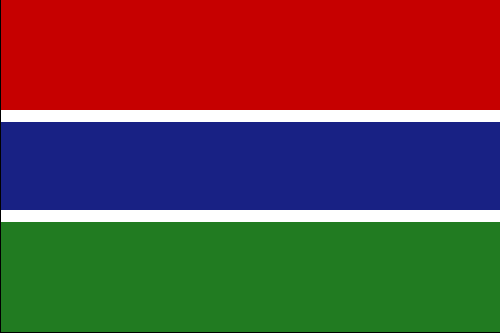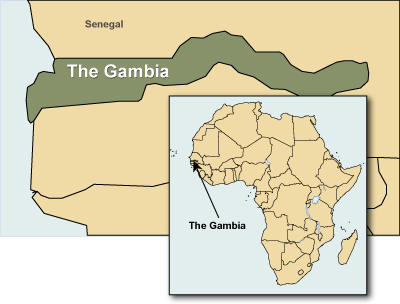West Africa: The Gambia
It is the smallest country on the continent of Africa. In comparative terms the Gambia has a total area which is slightly less than that of the island of Jamaica. The Gambia is surrounded on three sides by Senegal, with 50 miles (80 km) of coastline on the Atlantic Ocean on its western side.
A variety of ethnic groups live in the Gambia, each preserving its own language and traditions. The Mandinka ethnicity is the largest, followed by the Fula, Wolof, Jola, Serahule, Serers and the Bianunkas. The Krio people, locally known as Akus, constitute one of the smallest ethnic minorities in the Gambia. They are descendants of the Sierra Leone Creole people and have been traditionally concentrated in the capital.
 |
|---|
 |
 |
 |
 |
 |
 |
 |
 |
 |
 |
 |
 |
 |
 |
 |
 |
 |
 |
 |
 |
 |
 |
 |
 |
 |
 |
 |
 |
 |
 |
 |
 |
 |
 |
 |
 |
 |
 |
 |
 |
 |
 |
 |
 |
 |
 |
 |
 |
 |
 |
 |
 |
 |
 |
 |
 |
 |
 |
 |
 |
 |
 |
 |
 |
 |
 |
 |
 |
 |
 |
 |
The Gambia shares historical roots with many other West African nations in the slave trade, which was the key factor in the placing and keeping of a colony on the Gambia River, first by the Portuguese and later by the British. On 18 February 1965, the Gambia was given independence from the United Kingdom and joined the Commonwealth of Nations, from which it withdrew in October 2013.
The Gambia was led by President Dawda Jawara, who was re-elected five times. The relative stability of the Jawara era was first shattered by an attempted coup on July 29, 1981 which followed a weakening of the economy and allegations of corruption against leading politicians. The coup attempt occurred while President Jawara was visiting London and was carried out by the leftist National Revolutionary Council, composed of Kukoi Samba Sanyang's Socialist and Revolutionary Labour Party (SRLP) and elements of the "Field Force" (a paramilitary force which constituted the bulk of the country's armed forces). President Jawara immediately requested military aid from Senegal which deployed 400 troops to Gambia on July 31. By 6 August, some 2,700 Senegalese troops had been deployed and they had defeated the rebel force. Between 500 and 800 people were killed during the coup and the resulting violence.
In 1982, in the aftermath of the 1981 attempted coup, Senegal and Gambia signed a treaty of confederation. The Senegambia Confederation aimed to combine the armed forces of the two states and to unify their economies and currencies. After just seven years, Gambia permanently withdrew from the confederation in 1989.
In 1994, the Armed Forces Provisional Ruling Council (AFPRC) took over the State House and the Jawara government by military coup and banned opposition political activity. Lieutenant Yahya A.J.J. Jammeh, chairman of the AFPRC, became head of state. The then 29-year-old dictator remains president to this day.